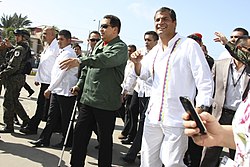الأربعاء، 6 مارس 2013 - 01:21
هوجو تشافز
Scary picture.

Illness and death[edit]
Chávez was diagnosed with cancer following the discovery of a mass in his pelvic region in June 2011. He traveled to Havana, Cuba where he underwent a surgical operation which removed a malignant cancerous tissue mass 'about the size of a baseball' from his waist. He underwent a second surgical operation in Venezuela one month later. Over the next 12 months, the President followed a cycle of chemotherapy that had obvious effects on his body (hair loss, some weight loss and bloating, etc.) during the Presidential Election campaign in mid-2012. The type of cancer Chávez was diagnosed with was never made public which fueled speculation over his condition (with speculations from being prostate cancer to colon cancer among others). Following the presidential election in October 2012 (where he was re-elected to a fourth term), he was flown back to Cuba for medical treatment and to return to Venezuela and stay at an army hospital only weeks before his death. Successive announcements of his return and updates of his health were criticised by the country's opposition that the population were unaware of the president's health and location. The fact that the cancer had metastasised was not made public during the campaign, and strongly denied by Government officers. After the first lung infection (pneumonia) in the last stages of his life, the President was intubated nearing the end of December. His breathing worsened until his death was announced at 16:25 VET (20:55 UTC) on 5 March 2013. Hugo Chávez died in Caracas, almost two years after he was first diagnosed. The opposition has long argued that the President was artificially kept alive, presumably in a coma, up to the start of his next term, to avoid triggering a new election.
Vice-president Nicolás Maduro announced Chávez's death on a mandatory television cadena (a decree forcing all broadcasters to relay State television content).[3]In an emotional eulogy Maduro said: "Let there be no weakness, no violence. Let there be no hate. In our hearts there should only be one feeling: Love."[4] Maduro indicated that Chávez had died "after battling a tough illness for nearly two years."[3] He added that police and troops would be deployed across the country 'to guarantee the peace.' The head of the presidential guard said Chávez died of a massive heart attack after great suffering and had inaudibly mouthed his desire to live. In an interview to the Associated Press he said that Chávez could not speak but he said it with his lips ... "I don't want to die. Please don't let me die".[5] The BBC reported isolated incidents of violence following the announcement of Chávez's death. Although pro-Chavez supporters attached and burned tents of students who had camped demanding more official information about Chávez's health, there were no reported injuries.[4] Vice-president Maduro indicated he had "no doubt" of foul play by "the historical enemies of our fatherland" behind Chávez's illness and death.[3] Defence Minister Diego Morelo Bellavia[6] said that the "Bolivarian" armed forces would be loyal to the vice president and National Assembly and urged supporters and opposition to remain calm.[4]


No comments:
Post a Comment